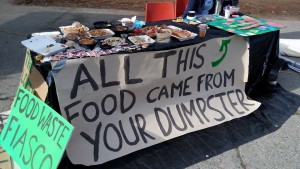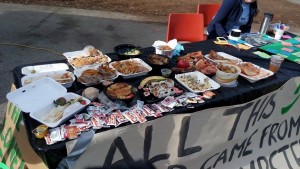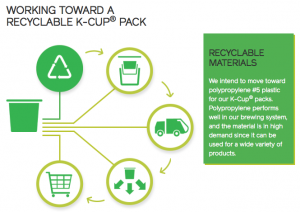Early last month, Common Energy’s Zero Waste team conducted the second annual waste audit of the SUB. Common Energy UBC is an active, student-run organization on the UBC campus devoted to sustainability. The Zero Waste team was created to help promote the “Sort It Out” program that AMS Sustainability has implemented to “decrease the volume of waste sent to landfills, engage campus users through events or activities, and push to make all UBC events zero-waste”. This is all part of AMS Sustainability’s initiatives for a greener UBC campus. I was hoping that the waste audit results would be released by now, but it hasn’t yet so I won’t get to talk about the results. (And much to my dismay, last year’s data can’t be found either!)
Once again this year, they gathered student volunteers for a one-day trash sorting outside the SUB. My sister was one of them. Their role was to sort, weigh, and document a day’s worth of the SUB’s daily waste.
“Each year, AMS operations and businesses produce approximately 400 tons of waste.”
That’s a lot of garbage, and I’m not surprised, with the rate at which I see fellow students throwing perfectly recyclable content and food scraps into the garbage bin. Student waste consumption is a cringe worthy sight, and visibility was the basis for conducting the waste audit outside the SUB. Volunteers were sorting garbage bins right outside the SUB by the North entrance, facing Gage towers, intercepting many students as they passed by to reach the bus loop. This year featured increased foot traffic due to construction of the new aquatic centre blocking off pathways and creating detours around the SUB.
Students were able to see the volunteers at work and the resulting piles of incorrectly sorted waste their peers created. A desk full of unfinished food found in the garbage can sat in the open for all to witness.
How shameful, look at those untouched bowls of rice! Absolutely wasteful of perfectly edible food. If you aren’t going to eat it, at least compost it. This visual representation is a cue to call, an alarm or red flag more like, for students to recognize the impact they create with a single day of waste. Educational booths were also set up for students to learn about this annual waste audit and what they can do to reduce their waste production.
My opinion is that visual representations of the impacts of normalized actions such as throwing away garbage recklessly, driving, leaving lights on and faucets running, and so on, are extremely effective is causing consumers to stop and reassess their actions, yet also working to reaffirm positive behaviour. Hopefully with the new student union building, the Nest, students will be more inclined to keep it looking beautiful with proper trash sorting. No doubt, AMS Sustainability will improve and refine their Sort It Out program based on this year’s waste audit results.
Source(s):


